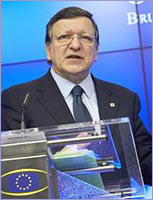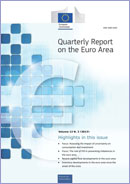|
|
|
|
|
|
 |
 |
 |
 |
European Council concludes European Semester
At their meeting on 27-28 June, EU leaders concluded the 2013 European Semester by generally endorsing the country-specific recommendations on the basis of the Commission recommendation of 29 May. Member States will now translate the recommendations into their forthcoming decisions on budgets, structural reforms and employment and social policies, while promoting full national ownership and preserving social dialogue. The Council and the Commission will closely monitor their implementation. The European Council also welcomed the abrogation of the excessive deficit procedure for several Member States as well as the efforts of those countries that are expected to meet their fiscal targets. It noted that for some Member States, the pace of fiscal consolidation has been adjusted to respond to economic conditions, as provided for in the EU fiscal framework.
|
 |
 |
 |
|
 |
 |
 |
 |
 |
|
 |
 |
 |
| …reforms are not enough, and the reality is that sometimes reforms are taking too long to produce results, especially in terms of employment. This is why we also need investment, investment for the SMEs and also investment for the most acute social problem in Europe which is unemployment, including particularly unemployment of young people. |
 |
José Manuel Barroso, President of the European Commission
|
|
|
|
 |
 |
 |
 |
Eurogroup agrees on instrument for direct bank re-capitalisation by ESM
The Eurogroup has agreed upon the main features of an operational framework for the European Stability Mechanism's (ESM) direct bank re-capitalisation instrument, and thus paves the way for this instrument to act as a tool in addressing the sovereign – banking link. The instrument will be subject to strict eligibility criteria that will apply to both the requesting ESM Member and the potential beneficiary financial institution An appropriate level of bail-in will be applied before a bank is re-capitalised by the ESM in line with EU state aid rules and future principles of the forthcoming Bank Recovery and Resolution Directive (BRRD). Furthermore, a burden-sharing scheme will determine the respective contributions of the requesting ESM Member and the ESM in order to ensure an appropriate alignment of incentives and re-capitalisations will be limited to a maximum of EUR 60 billion.
|
 |
|
 |
 |
|
 |
 |
 |
 |
European Council agrees on comprehensive approach to combat youth unemployment
In consultation with social partners, EU leaders have agreed on a comprehensive approach to combat youth unemployment. They will speed up implementation of the “Youth Employment Initiative”, which should be fully operational by January 2014, and concentrate spending in its first two years. They will also speed up implementation of the “Youth Guarantee”, which is designed to get young people who are not in education, employment or training back to work or into education or training within four months. In addition, unspent funds from the EU budget will be reallocated to support employment, especially for youth, as well as innovation and research. This is made possible by the flexibility of the EU budget, or Multi-annual Financial Framework, for the next seven years. EU leaders therefore welcomed its final approval at the same occasion. The European Council also agreed on measures to promote cross-border mobility, including for vocational training. The “Your First EURES Job” programme will be strengthened and the “Erasmus +” programme should be fully operational from January 2014. High-quality apprenticeships will be promoted via the European Alliance for Apprenticeships to be launched in July.
|
 |
|
 |
 |
|
 |
 |
 |
 |
Eurogroup recommends Latvia’s joining the euro area; congratulations from European Council
On 21 June, euro area finance ministers recommended Latvia's accession to the euro area from 1 January 2014. The euro area Member States’ recommendation draws on reports from the Commission and the European Central Bank on the fulfilment by Latvia of convergence criteria and other requirements that are a precondition for joining the euro. On 28 June, the European Council congratulated Latvia for fulfilling the convergence criteria of the Treaty. At the Ecofin Council meeting on 9 July, EU finance ministers are expected to formally approve Latvia’s accession.
|
 |
|
 |
 |
|
 |
 |
 |
 |
Council extends maturities of EFSM loans to Ireland, Portugal
EU Finance ministers have agreed to extend the maturities of loans to Ireland and Portugal from the European Financial Stabilisation Mechanism (EFSM). The decisions were adopted during a Council meeting on 21 June. At an informal meeting in Dublin on 12 April, ministers had agreed in principle to lengthen the maturities of loans granted to Ireland and Portugal under the EFSM and the European Financial Stability Facility (EFSF). This involves increasing the average maturity by seven years, from 12.5 years to 19.5 years, in order to smoothen the countries’ debt redemption profiles and lower their refinancing needs in the period subsequent to their economic adjustment programmes. The aim is to support the two countries’ efforts to regain full access to market financing and thus to successfully exit their economic adjustment programmes. A parallel agreement has been reached within the EFSF governing bodies in relation to the loans provided by the EFSF.
|
 |
|
 |
 |
|
 |
 |
 |
 |
G8 Leaders discuss global economic and political issues
President Barroso and Van Rompuy participated in the G8 Summit on 17-18 June, which took place at Lough Erne in Northern Ireland under the chair of the UK G8 Presidency. Leaders discussed the global economy and foreign policy as well as the UK’s “three T” priorities, namely trade, taxation, and transparency. In terms of the global economy, leaders agreed that promoting growth and jobs remains the top priority. They also shared the view that the global recovery should be nurtured by supporting demand, securing public finances, and exploiting all sources of growth. Leaders agreed that the fight against unemployment, particularly youth unemployment, remains critical. In 2014, Russia will take over the G8 Presidency.
|
 |
|
 |
 |
|
 |
 |
 |
 |
Employment: Commission proposes to help jobless by improving efficiency of public employment services
EU Member States’ public employment services have a crucial role to play in helping the 26 million unemployed in Europe to find employment. This is why the European Commission would like to foster closer cooperation among public employment services so that they can better address the needs of the unemployed and businesses. The Commission proposal would establish a platform for comparing the performance of public employment services against relevant benchmarks, identifying best practices and fostering mutual learning. Public employment services are vital in ensuring a better match between jobseekers with particular skills and employers looking for these skills. Despite record unemployment in Europe, 1.7 million vacancies remain unfilled in the EU. The network would also provide support for the practical implementation by Member States of employment policies, such as the Youth Guarantee agreed by the EU’s Council of Ministers.
|
 |
|
 |
 |
|
 |
 |
 |
 |
Commission proposes new long-term investment vehicle
The European Commission has proposed a new investment vehicle designed for investors who want to put money into companies and projects for the long-term. These private European Long-Term Investment Funds (ELTIFs) would only invest in businesses that need money to be committed to them for long periods of time. The new Funds would be available to all types of investors across Europe subject to certain EU legal requirements. ELTIFs would invest in illiquid assets that are difficult to buy and sell. Moreover, to provide firms with “patient capital”, investors would not be able to withdraw money until the specified end date of their investment, but they would would benefit from the regular income stream produced by the investment asset and possibly collect an illiquidity premium.
|
 |
|
 |
 |
|
 |
 |
 |
 |
New rules on Credit Rating Agencies enter into force
On 20 June, just one and a half years after the Commission made its proposal, new rules on credit rating agencies entered into force. Under the new legislation, credit rating agencies will have to be more transparent and accountable when rating sovereign states. The new rules will also contribute to increased competition in the ratings industry, which is currently dominated by a few market players. Moreover, the new rules are expected to reduce the over-reliance on ratings by financial market participants. This is an important step towards restoring financial stability and trust in financial institutions, and will help to avoid further crises.
|
 |
|
 |
 |
|
|
|
 |
 |
 |
 |
Quarterly report on the euro area
The latest Quarterly report features two focus sections. The first assesses the impact of uncertainty on consumption and investment. It finds that uncertainty has a significant negative impact on household consumption and productive investment, and that this impact has increased since the crisis. The second focus section analyses the role of foreign direct investment (FDI) in preventing macroeconomic imbalances, concluding that FDI can boost productivity and support external rebalancing in the host economy. A special topic on capital flows in the euro area concludes that financial capital flows into and from euro area economies are showing signs of normalising. A final contribution on inventory developments in the euro area suggests that stock building by companies has weakened since the onset of the crisis, driven both by depressed sales prospects and by financing constraints.
|
|
 |
|
|
|
|
|
|
|
|
|
|
|
|
|
|
|
 |
| Directorate-General for Economic and Financial Affairs |
 |